
Vol. 1, No. 13 Published by India China Division, Air Transport Command April 12, 1945
|
Among Aims of GIs Questioned
In China About Postwar Work
Two Were Bookies
1338 BU, China - A comprehensive survey, conducted among GIs at this base, indicated a variety of outlooks concerning jobs and businesses the men expect to continue or begin after the war.
The interviews showed two main trends. growing ambition to own and operate individual businesses was prevalent. Many expressed satisfaction with their past employment.
Education Attractive
A fraction more than 49 percent of the men interviewed said they wanted to go back to their own line of work. The question was purposely not limited to designate the same job. Fourteen percent of these men were in business for themselves before coming into the Army. Eight percent of the men were quite definite about wanting to change occupations.
Educational opportunities, outlined in the GI Bill of Rights, attracted 17 percent. After finishing their schooling these men are about evenly divided in wanting to work for themselves or for others.
Individual Enterprise
Various ideas were mentioned by the men who want to be self-employed. Most of them are interested in such occupations as farming or management of retail stores.
Each of these men has a location already in mind where demand, supply, and competition are favorable factors. In nearly every case answers showed a pent-up enthusiasm to meet the challenge of individual enterprise.
Three men said that working for ATC has aroused their interest in post-war aviation. One wants to manage his own small landing field, while the others want to work for airlines.
Bookies Too
An interesting coincidence turned up when three men said they had earned a living following the races before the war. Two of them were bookies, operating on the theory that you can't beat the races. The third man had followed the hay burners around the country for seven years and, through a system, blew holes in the theory of the other two. All of them plan to return to their old occupations.
Inevitably an individualist comes up with an answer which shows some thought. "I'm going to marry into a favorable financial position." this one remarked, "and then I'm going to take it easy. I've already picked the girl."
A general summary showed that not too many men were sure their old jobs were open to them. Of those who planned to go back to their old line of work many showed uncertainty by stating they "would like" to go back to their former jobs.
GI Discovers A 'Lost Village' In Jungle Trek
Superstitious Bearers Back Down and He Goes On Alone
1332 BU, Assam - After several unsuccessful attempts, Pfc. William Bailey finally found a "lost village" in the jungle of the Dihingmuhk tract near this base.
Assigned to the jungle indoctrination camp here, Bailey picked up among the bearers a rumor of a lost village in the jungle. His curiosity was aroused to such an extent that he decided to explore the region.
Cross Country
The bearers gave him approximate directions willingly but refused to accompany him on the search. Superstition had it that evil would befall the family of anyone who went there.
After two unsuccessful attempts to locate the village, involving an 18-mile trek through dense undergrowth, Bailey heard of an old, unused road. He covered the first five miles of the road by jeep and arrived at a river spanned only by a foot bridge. From there he traveled on foot through jungle, across rice fields and over frail-looking bamboo bridges.
Bailey was on the point of chalking up another "near miss" when he spotted among the trees an unusual outline of a large earth-like mound. He made his way through swamp to a large area enclosed by a stone wall. In the center of the enclosure stood the ruins of an old temple, with trees and bushes growing through the dome.
Plans To Explore
Investigation, as yet incomplete, indicates that this temple could have been the capital of the conquering Ahom tribes before they moved to Sibsigahr, where there are more extensive ruins, dating back to the 15th century.
Whatever it is that Bailey found, plans are underway, and permission has been obtained, to make exploratory excavations at the site when the monsoon season is over.
As tales of the lost village begin to circulate in the area, the new "find" promises to become one of the prime points of interest for those visiting the jungle indoctrination camp.
Furrows Appear in Officer's Brow as He Awaits Heir
1326 BU, Assam - Lt. Dave Field, a pilot here, thinks he should get some time logged toward his rotation eligibility for the long "sweat" he experienced while his wife was expecting.
No airplane trip ever caused him as much anxiety as the long wait and misleading news incidental to his becoming a father.
When Field's wife informed him that the baby was expected to arrive, in a Chicago hospital, on March 5, the initial furrows crept into his brow.
'This Afternoon'
On the 15th he reasoned that any letter postmarked after the 5th should bring the big news. An airmail letter from his mother dated the 6th was undoubtedly it. He ripped it open to find that his mother was waiting too. Then he received a letter from his wife, dated the 8th. But again he was disappointed. She was also on the waiting list. The last line gave some hope when his wife wrote, "The doctor wants me to go to the hospital this afternoon."
V-mail Scores
On the 25th there was a cablegram in his mailbox. Even his friends were a little nervous by now. Amid a crowd of well-wishers he opened the message and read, "Expecting blessed event. I'm all right. Anxiety unnecessary." His buddies wondered how much more he could stand.
The 27th brought a letter from his wife explaining that the baby was 11 days late but everybody was fine. In Chicago the doctor by now had joined the waiting list. Everybody was fine - except the husband. Realizing that his wife's anxious moments were more serious than his own, he consoled himself, but the creases dug deeper into his brow.
Then finally came the news that a five-pound girl named Jean Ann had arrived. Good old V-mail scored the victory.
Don't Look Now - But Lizard Lifters Get Krait Crate
1328 BU, Assam - Whoever was trying to play a practical joke on Sgt. John L. "Doc" Packer on April Fool's Day by stealing one of his blue snake cages with five lizards in it may find the prank back-firing. The cage also contained a yellow-banded krait, most venomous snake known.
On the same day that the krait was stolen, Packer added a five-foot, full-grown Indian cobra to his collection of reptile. MPs Pfc. John Dyer, Pfc. Johnny Entrekin and Cpl. E. Sandy discovered the cobra eating their pigeons and immediately called Sgt. Packer, snake connoisseur to the medics, who went to the MP area and captured the specimen in perfect condition.
As this is written one of his pigeons has gone on an egg-laying spree and has produced a total of 38 to date.
Bovine Strays Being Hounded, Impounded
1330 BU, Assam - The cow that wanders freely o'er the land of India from shore to shore, while friendly, is not over-bright, and has not heard that props can bite.
Upon a runway now and then, thinking themselves remote from men - hearing too late a warning hum - some cows have little steaks become.
The provost marshal wallahs here have found the answer, never fear - all wandering cows that now are found are being impounded in a pound, and there endurance vile they stay, removed from harm's and mischief's way, until the owners go their bail, in which the owner's seldom fail.
The cow-co-ordinating man, Lt. E. L. Lenihan, states that the threat of cows that wended their way across the strip is ended. Beefsteaks noted in the future annals will be obtained through Army channels.
First Replacements for ROs Begin to Arrive in Division
1332 BU, Assam - "What is so rare as a day in June?" The answer comes ringing from the Assam Valley: "Radio operator replacements!"
The kilocycle boys have been waiting for replacements a long time and now they have begun to arrive. One of the first to report for duty was Cpl. Robert F. Reyher, of Terre Haute, Ind.
Cpl. Reyher is one of the vanguard of several hundred radio operators scheduled to arrive in ICD as replacements for those being rotated to Uncle Sugar, according to word received recently from Washington.
He got a hearty welcome, briefing in landing procedures, and a check flight from the top man on the rotation list, Cpl. Frank H. Sylanovich, Exeter, Pa. Then the boys wished each other luck, one for a good trip over the Hump, the other for quick rotation orders.
No Man-hours Lost Through Accident at 1311 During March
1311 BU, Assam - Not a single man-hour was lost at 1311 because of injuries during March, it was revealed in a letter commending all base personnel.
"It is my desire," Lt. Col. Lee W. Willey, CO, said, "to commend the men of this command for the excellent safety record of the past month. The fact that our operations were greatly increased during the month of March indicates that you are co-operating to the fullest extent with the safety program."
The ground safety program is directed by 1st Lt. Lowell E. Green.
Indiaside Shop Producing Posters Is Complete With Its Flagon of Castor Oil
T/Sgt. Franken Had Rugged Time Setting Up Silk Screen Unit
Hq., Calcutta - Chances are that the three-color "flying safety" poster you were looking at this morning, down at the operations office, was processed by T/Sgt. Raymond C. Franken, of the I & S graphic information unit, with his little bottle of castor oil.
Not that it's all that simple, as T/Sgt. Franken will testify. He has had his worries in setting up the silk-screen shop, believed to be the only one in India, where the brilliantly colored posters, designed by T/Sgt. William A. Jeffrey, are painstakingly ground out.
No Squeegee
The paint used in the silk-screen stencil process is quick-drying - quick-drying, that is, in the States. In the heat of midday Calcutta in the spring, it dried so fast that it gummed up the works. Gasoline, kerosene, and other thinning agents were tried and discarded, and that was where the bottle of castor oil came in, requisitioned from the medics. It just filled the bill, and has become an indispensable item in the shop.
Another pressing problem was getting a squeegee, the strip of rubber mounted on a board, to distribute the paint over the surface of the silk screen covering the stencil, and to push the paint through the silk. When the shipment of special paint arrived, no squeegee was with it, and none could be obtained in Calcutta.
A makeshift constructed fro a section of a plastic T-square was tried, and worked for a while, but then began to wear out the silk at a prohibitive rate. Finally a conference with S & S evolved the perfect squeegee strip - part of a discarded expander-tube
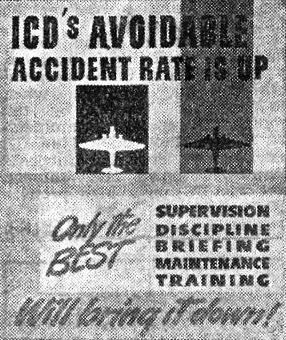
|
96 Hour Schedule
The original small lot of supplies for the silk-screen project was procured as a personal gift by a member of the graphic information unit from his former employers in the States. While these initial supplies were being airlifted to Calcutta, T/Sgt. Franken was brought into the headquarters unit from his China base to build the necessary shop facilities. With borrowed tools, the sergeant became a carpenter and painter.
The shop, as now perfected, is a Calcutta imitation of Franken's Chicago shop, Avalon Studio, at the triple intersection of Elston, California and Belmont avenues, where he produced similar posters for political campaigns, conventions at large hotels, and such deals as that. After entering the Army he continued work as a sign wallah for some time at Romulus Army airbase near Detroit. He took off last September for the land where silk is for saris.
The process developed in the shop is hailed as an ideal method for large-scale rapid production of the colorful poster used in the current safety campaign. A run of 300 posters is currently being turned out on a 96-hour schedule.
It Was Rag Night at the Theater - Plan Cleaned Up
1337 BU, Assam - "Just bring any old rag to the movies" was the word spread around the base.
Those who thought they had misunderstood could scan the bulletin board in front of "the largest theater in the theater" and see the notice, "Admission tonight, one rag per man."
It was not a typographical error and was well within the realm of possibility, and actually was of some urgency.
Aircraft maintenance had been using rags for wiping down planes and engines and the supply was depleted. Lt. Col. George S. Cassady, CO, hit upon the scheme of asking each man to bring a rag of some sort with him if he wanted to attend the theater.
So the rags started pouring in, The more ridiculous the rag, the greater the satisfaction of the contributor. The evening's total was two well-filled GI cans.
|
- If You Can Find Him
Hq., Calcutta - "Oldest first sergeant of his grade in India," is the boast of Pfc. Willie Osborn Brennan, acting topkick of "H" area at this base. And he'll buy a case of beer for the man who can prove him wrong.
"Pop" was 52 last November, and he's still going strong in his second world war. He left his wife at home in Greensboro, N.C. (home of O. Henry, whom he knew well in his boyhood) and enlisted when the present struggle broke out, because he wanted another wallop at the Jerries.
Like many others, he finds himself a bit out of touch with his ancient enemy here, but it's OK with Pop. "It's all one war" he says, "In France or in India, and the Army is still all right. They'll never get me out of it with that $300 payment - they'll sure enough have to raise the ante some!"
Strange Serial Number
Pop's serial number has worried a lot of people. It has only five digits - 27991. They were going to slap a new number on him when he signed up this time, but he produced his old, round dog tags and held out for the number he carried through more than a year in England and France as a member of the signal corps back in 1916-17. Ever since, he's run into an unending series of baffled clerks who want to know whether the first three numbers or the last three are missing. He doesn't mind explaining, though - in fact, he gets sort of a bang out of it.
It seems there were 25,000 men in the first convoy to cross with Pershing, and Pop just missed the shipment, which, as he recalls, ran away with serial numbers up to 25000. He was among the next couple of thousand to be numbered in the second convoy which totaled eight shiploads. After his 15 months of overseas service, he returned home on the old battleship Vermont.
Son in Italy
Pop is an active member of the John Wesley Long post (2087) of the Veterans of Foreign Wars in Greensboro, an he keeps in touch with the outfit regularly while in India. He is proud of the fact that the post adjutant is the VFW's past national commander, Otis Brown. The post has received Hump Express regularly since the first issue fell into Pop's hands, and members have written him enthusiastic letters of thanks for the information it conveys to
|
His older son, W. O. Brennan, Jr., is a Pfc. in the infantry in Italy. A younger son, Harry, has broken family tradition to join the Navy and is serving on the battle cruiser Augusta.
Rank No Problem
For a few months, before coming to India, Pop was with the AAF in Africa. He was transferred to ICD and moved on to Baksheeshland in July, 1944. He was appointed acting first sergeant about four months ago.
Lack of rank doesn't trouble Pop in administering his duties as topkick, though most residents of the area outrank him.
But he doesn't rely on tyranny to get results, believing that a first sergeant's responsibilities include no bullying. He dispatches the duties involved in keeping the squadron on the ball and allows himself enough spare time to indulge in two hobbies, his garden and his cats.
As for the cats, all they need to do is keep out of the garden to rate all the fond attention a cat can earn, maybe more. Men of the squadron have named them Sad Sack and Larry Belle - "Lulu Belle" until complications developed recently.
28-piece Bands to Serenade Sahibs of Assam, Bengal Wings
Music lovers at Assam and Bengal wing bases will welcome the arrival of two complete 28-piece military bands to play for concerts, dances, parades, reviews and other functions.
The 756th AAF band, directed by CWO Harold H. Waite of Hazelton, Pa., will be stationed at 1346 BU. It includes two dance orchestras. Among the members are T/4 Roy C. Peters, formerly with Glen Miller's and Jack Teagarden's orchestras, and T/4 Robert Skiles, who played with Fred Waring, Johnny Green, Vincent Lopez, Phil Harris and Teagarden.
The second unit, the 741st AAF band, is assigned to 1330. CWO Henry G. Zeh, former director of Chicago's large National Guard band, is the leader. T/5 Frank Schalk, Chicago, one-time member of Bob Chester's orchestra, heads the list of former "big-timers."
Sub-Pvt. O'Connor Soups-up Malaria Control Lectures
1345 BU, India - The old malaria control lectures that once went over like a lead balloon now bring the house down when they are conducted by Sub-Private Oscar O'Connor, GI Charlie McCarthy, and his assistant, Sgt. Pete Balrich, the ventriloquist.
Utilizing a question and answer dialogue, Pete and Oscar deliver a 15-minute stint which GIs actually enjoy.
Sgt. Balrich volunteered to use Oscar to liven lectures and to get him out of the dummy stage.
|
For Shuttle Runs In
China Circuit, Too
1350 BU, Kunming - The first deluxe Stateside C-47 airliner has made its debut at this field to innovate a new daily shuttle run.
The plush-lined passenger plane makes a circuit of several China bases and returns the same evening in six hours' flying time.
This C-47 was built in conformity with plans for postwar planes, having such modernistic features as a reading lamp, soft reclining seats and ash trays. Hot coffee and K rations are served.
An electric sign, controlled by the pilots, flashes such admonitions as "Buckle seat straps," "No Smoking," "Tighten parachute." The plane has all the conveniences of a commercial transport, with the exception of a stewardess, who is supplanted by the flight clerk.
The crew on the maiden shuttle hop included Lt. William H. Butterfield, pilot; Lt. Carlton K. Schank, co-pilot; Cpl. Richard W. Morrison, engineer, and Pvt. R. Sweeney, flight clerk.
Chinese Hosts Gin-and-Dine Parachutists
Lavish Hospitality Greets Lost Trio on East Hump Slopes
1328 BU, Assam - A story of generous Chinese hospitality was told by crew members of a C-46 who bailed out recently in Yunnan province on the eastern slopes of the Hump when their plane ran out of gas.
Members of the crew were F/O Donald W. Chisholm, pilot; 2nd Lt. Kenneth E. Thompson, co-pilot, and Pvt. Clifford A. Moore, radio operator.
The men jumped at approximately 4 a.m., and with the exception of the pilot, who had a couple of ribs broken, all landed safely, though widely separated. Pvt. Moore came down in a large thorn bush, but after contemplating the rain, the darkness and the howling animals below him, he decided to remain in his prickly perch until daylight.
Hearty Meal
In the morning, from a nearby peak, he noticed a village about three miles away and started for it after he had unsuccessfully attempted to locate the two other men. In the meantime, Lt. Thompson had begun to walk toward the same village.
Soon he was approached by a Chinese, whom he learned had been following him for some time. Continuing on their way, they were met by a searching party organized by Pvt. Moore. For the remainder of the day a search was conducted for F/O Chisholm. When the men returned to the village at night, they received a note from him informing them that he was safe in the next village.
For supper that night, Thompson and Moore ate a hearty meal of boiled chicken, rice, eggs, gin and water. That night they slept on a table covered with a blanket. Chinese attendants kept a fire going all night.
High Praise
The next morning, after breakfast, they set out on horseback for the village to pick up the pilot.
|
Arriving at the next village, the men had Chisholm's ribs bandaged and placed him on a horse for the trip to an airbase from which they were returned by plane to their home station. All three men were lavish in their praise for the fine treatment given them by the Chinese and for the co-operation facilitating their return to the home station.
482 Paste-ups Load Tent-top with Ooooomph
Ceiling is Peppered with Charmin' Women by Assam Quartet
1330 BU, Assam - There's nothing like tent-top paste-ups when you're feeling pent-up. The four residents of a tent at this Valley base believe in them so much that they have 482 beautiful gals pasted on their "ceiling" - and more to come.
"No use doing anything half-way," declared S/Sgt. Don Harkleroad, Houston. "We were kind of late getting into this but now that we're in, we're going to see it through."
His tentmates are M/Sgt. Ernest L. Badders, San Antonio; T/Sgt. Frank Hallier, Phoenix, and Cpl. Nelson J. Rivenburg, Rahway, N.J. All have had a hand in the deal, though Badders jealously does the actual pasting.
When the entire ceiling was about three-quarters decorated, it was decided to obtain a new outer roof for the tent, and a paste-up backlog was established, the remaining available pretties being held in abeyance until the arrival of the new outer covering, lest the repair-wallahs might dislodge them in prancing about atop the tent.
The new outer roof was installed, with minimum damage to the incumbent babes - thanks to Harkleroad's indefatigable watchfulness.
The boys haven't counted the new ones yet, but they're confident that when the job is done, there will be no more bare space left on the ceiling than is strictly necessary to set off each of the charmers suitably.
Old April Fool Gag Really Works at 1305
1305 BU, Calcutta - Anyone who has ever wrestled with a Calcutta telephone exchange can appreciate this belated April Fool story.
When the lieutenant walked into his office a sergeant told him that a caller, obviously a woman, had asked for the officer and wanted him to call South 756 and ask for Mr. Fox.
After the operator made the connection, the lieutenant asked for Mr. Fox. A slight pause and then came the answer. "We have many foxes here. This is the Calcutta zoo."
Create Photo Lab, Then Form Photo Club Around Same
1340 BU, Kunming - Photo clubs are easy to organize but when the entire lab has been homemade, down to the enlarger and printer, it takes a group of enthusiastic cameraphiles.
The club here, organized by Pfc. Morton Haftel, Philadelphia, Pa., has been in operation but a short time, but already lists 15 members, with others joining daily.
Discarded roofing-felt made the darkroom lightproof. The inside is made from odds and ends. A safelight was built from a tin can covered with yellow tissue paper. The printer is a wooden box with a few bulbs under a sheet of white paper that acts as a diffuser glass. Another wooden box was mounted on a track to form the rudiments of an enlarger.
Members are dependent upon what supplies and chemicals are received from friends here and in the States. All the gifts and contributions are pooled.
Another feature of the club is a course in photography open to anyone wishing to attend classes.
Daily News Scores - Danton Sees 35c Sapphires in PXs
Hq., Calcutta - You can find a lot of amazing things about this exotic land in the U.S. press these days - dhobis described as general servants in the New Yorker, amahs lined up for inspection with their WAC mistresses in Time - but Danton Walker of the New York Daily News has topped them all.
Here is what he had to say in his column of March 14:
"Read this and weep: In the PXs in India, the counters display amid the razor blades and gum, star sapphires retailing at 35 cents each. (You can't buy them from here.)"
Danton, you sure rang the bell with that second sentence, but the first one is a bit fouled up.
This will be great news to GIs who have sweated through many a tour of Calcutta shops, PX and otherwise, and never glimpsed a star sapphire even as big as a small pea offered for less than 20 bucks, at the inside.
Some of them are wondering if conditions in the Calcutta shops are less than typical of India, but most of them are wondering if the Walker leg hasn't been pulled half-way from New York to Calcutta.
|
Brush, Poses for Profilist
Hq., Calcutta - Readers of Hump Express who have been scrutinizing the weekly brush drawings of Capt. James P. Scott, ICD artist, may be interested in knowing the man behind the brush.
That word "brush" may be taken two ways, because Capt. Scott takes plenty of ribbing about the hirsute adornment on his upper lip.
He brings to his ICD job a background wealthy in art training. For seven years prior to the time Uncle Sam tapped him on the shoulder in March, 1942, Scott was professor of art in the Fine Arts College of the University of Arizona. He taught anatomy, figure drawing and water color - a job to which he hopes to return after the war.
Traveled to Mexico
Scott attended the Chicago Art Institute from 1928 to 32 and had his work exhibited at the International Watercolor show in Chicago in 1931 and in two consecutive showings of the International Exhibition of Wood Engraving and Lithography.
During university vacation periods, the artist spent his time traveling, visiting the Sonora State Fair at Hermosillo, Mexico, during Thanksgiving vacations and spending time in Guererro, southernmost state along the west coast of Mexico, during summers. In 1939 he hopped a freighter and traveled second class to Tahiti.
He found Tahiti "so beautiful" he had to establish what he called "office hours" in order to get any work done. He did crayon portraits and watercolor landscapes - after paying a higher import tax on his French watercolors and paper than on any of his other belongings.
Went Through OCS
Induction brought Scott into the Army as a GI. He was an operations clerk at Williams Field, Chandler, Ariz., from March to October, 1942, and then moved to Bolling Field to work in photographic interpretation before moving into AAF OCS as a buck sergeant and out as a second lieutenant.
He was in charge of production and distribution in the safety education section at AAF Hq., Office of Flying Safety, Winston-Salem, N.C., and later transferred to the 481st Night Fighter Operational Training group at Orlando, Fla. He served as adjutant of a replacement training unit squadron and later of an operational training unit squadron, finally brought the ground echelon of the outfit overseas as its executive officer. His transfer to ICD came through last December and he has been working with brush and crayon since then.
Field Sketches
Capt. Scott now is doing a contemporary graphic history of ICD operations and activities. He has prepared a series on duty pilot, turnaround and passenger service, as a result of a field trip to Assam and Burma bases. He plans another junket shortly, to China.
The handle-bar mustache, which makes Capt. Scott the butt of no few jibes around Hq., was with him as a GI, but he left it at the main gate when he entered OCS, and picked it up again, gradually, on the way out.
|
About Laundry at 1330 BU
1330 BU, Assam - GIs at this base are stepping out with a springier gait and looking more like the ARs claim a soldier should.
Housed in what was once a tea drying shed is one of the most modern laundries in Assam. For 5 rupees a month or 2 rupees per bundle, base personnel can have their laundry, neatly pressed, delivered right to their squadron area.
After the inspector general and quartermaster decided that equipment lost to dhobi wallahs was out of proportion to the benefit derived, Pvt. Waldo R. Schultz was called upon to build a large-capacity mechanized job.
With the help of Sgt. Kenneth Pickard, Cpl. Richard Toohey, and Cpl. Leonard Robaezenski, Schultz scoured the base and countryside for fixtures needed.
Now the laundry boasts two washing and rinsing machines handling 200 pounds of clothes every ten minutes. A water extractor removes almost all the water from clothes and the sun takes over from there. For the monsoon season a drying room has been constructed which will be steam-heated and will dry clothes in a matter of minutes.
A bottleneck has occurred in the ironing department, but development of a mangle soon will have that straightened out. The laundry features a dry cleaning plant which has given many the first opportunity to wear clean ODs since arriving here.
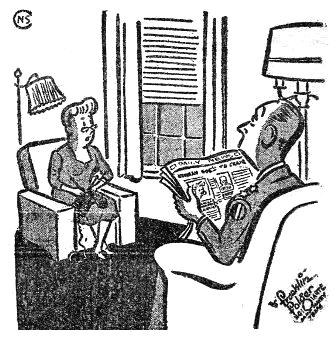
|

The Days Ahead
Some portentous events are in the offing - events which will change the life and work of every one of us.
The entire world is holding its breath for the blow-up in Germany. No hope can be held for the German armies other than the precious little time left them. It is becoming obvious that they cannot survive the terrible pressure against them many more weeks. It looks as if they will either disintegrate into a helpless rout, or throw down their arms. Hitler's generals reportedly have told him, "It is impossible to continue."
When Germany quits or collapses, events of tremendous military significance will take place. The great part of the Allies' military might in short order will be brought to bear upon Japan - an array of men, materials, weapons, ships, planes and power unlike anything ever witnessed before, even in Normandy or Germany.
The Southwest Pacific and adjacent areas will become the locale for the greatest air, sea and land offensives the world ever has known. ICD, because of the geographical areas it embraces and because its operation are so vital to the Asiatic war, will be right smack in the middle of it.
In the past, ICD has been commended for the efficient transporting of vast amounts of war materials to China. That can mean only one thing, that many men have worked together on a big job, and have worked well.
This is more than a great record of the past, it is an encouraging assurance for the future. Officers and men of ICD have given ample proof that for them no task is too great, no problem too difficult.
It is men like these who will turn the trick to the day ahead when the chips are down and the heat is on.
ATC and the Public
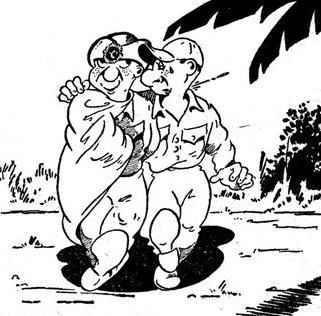 "Speak to me, pal."
"Speak to me, pal."
|
Men and women of all branches of the Army and the Navy, and of civilian agencies, such as the Red Cross, government bureaus, departments and committees, ride its airlines in the States and every foreign country unoccupied by the enemy. Now, civilians on business associated with the war ride as pay passengers.
What does this mean? It means that ATC, literally speaking, must always be sure its best foot is forward because it is almost constantly in the public eye. This is particularly true in foreign countries where impressions made by American soldiers are weighed heavily by civilian living under the tension of war.
Just one small example of how heavily is apparent in Dr. Vaswani's article on page 7, in which he tells of the intense interest (and apprehension) with which American soldiers were first greeted in Karachi.
Every ICD soldier should realize this: His behavior in a foreign country - which, incidentally, is his ally, fighting a savage war alongside him - either lifts his own country a bit in the eyes of an older and extremely sensitive part of the world, or lowers it. If anyone thinks that isn't important, think of it this way:
You wouldn't for a moment stand for the American flag to be lowered an inch from the top of the pole from which it proudly flies, would you? That is what happens, figuratively, every time you lower the prestige of your country in the mind of a national of any other country. And this prestige can be lowered by an accident of behavior which might seem to you, casually, to be nothing but a triviality.
|
OVER THE HUMP
Pvt. George Gardiner, 1346 BU, sends along a bit of verse written by a British artilleryman in tribute to ICD's men who fly the Hump. China, to China, and what of the way? Out of the shadow and into the day. Turn of the river and stretch of the plain; Shaft of the sunlight and threat of the rain. Fallow and forest, and clearing and clump, Also, you have to get over the Hump. Follow the flats where the cloud-shadows fall; Paddy and palm tree and swamp of Bengal; On, to the land of the wild Assamese; Nullahs and jungles, and tigers and teas. Down to refuel your heart gave a thump; Comb her and kiss her and over the Hump. Lift her, oh lift her! The cold of the height Stabs in the cloak of the gathering night; |
|
Bellow of engines and quiver and start; Catch in the breathing and thud of the heart. Moisten your lips as we bucket and jump, Hope for the best - when you're over the Hump. Mountain on mountain; all cavern'd below Beckons the wild panorama of snow; See in the moonlight, untrammeled, untrod, Rise up in glory the steeples of God; So, do you feel you're a pretty poor lump? That's the effect when you're over the Hump. Steady her, steady her! Earthward she comes; Clutch to the ache of your shattering drums; Hark to the screws, how the howl of them droops Into a hiss as she settles and stoops; Gently, oh gently! And scarcely a bump; Down, she is down - and you're OVER the HUMP. - Eric Crant, Gunner, British Royal Artillery |
The "Trojan" is a fast, high-priority daily air service from the Calcutta area to Kunming and back, cutting to less than five hours the time necessary to negotiate the distance non-stop. On every trip it carries "more than 10,000 pounds" - so much more, in fact, that it takes five trucks to haul away its cargo when it gets to Kunming. Designed by ICD to meet the need for transporting critical military items from Calcutta's seaport to China's aerial port of entry in a hurry, the Trojan run id flown by C-54 Skymasters. Only the most important items, most desperately needed, are aboard. Passengers whose travel is of greatest importance to the war are taken too. Actually the Trojan is more than one flight daily. Just how many more, military security forbids telling. Aircraft engines and special parts, unusual ordnance requirements, photographic materials, or almost any item badly needed, are loaded at the airbase in the Calcutta area. It's no small job, packing the tons and tons of freight aboard, scientifically apportioning it to the space available so that proper aircraft balance is assured, then tying down the whole load. Tie-down is essential, for even the four-engined giants which ply the route to China pitch and toss from time to time when they encounter crosswinds up to 75 miles an hour along the course. Only selected crews fly these planes, pilots with long, trouble-free records of transport flying, for real ability is at a premium on this critical run. Coming back from China, the Trojan brings out medical patients being evacuated to hospitals in India and the States, repairable aircraft engines, mail, and passengers, along with other assorted cargo. Service on board to passengers is furnished by the flight clerk, who makes them comfortable with blankets and a cup of steaming coffee when high altitude chills the plane's interior despite its heaters.
Editor's note: This is the second in a series of articles on India by Dr. Vaswani, noted educator and writer. A comparable series on China is being planned. It is now three years since American arrived in India, and it is natural that many of them desire to know how Indians feel about them. The first stage in the whole history of Indian reactions to the "invasion" of India by American armies may be said to lie somewhere between a month and two before the actual arrival of Americans in our country. The city of Karachi was then agog with tales of terror, the result of the activities of the fifth columnists. 'India Mortgaged'
"Not a virgin, not a rupee would be safe in Karachi; banks and buses would be held up in mid-day at the point of the revolver by Wild West cowboys and New York gangsters; Americans are coming because in its dire need, Britain has mortgaged India to U.S.A." - and son on. Most people expected, as they had seen it in the American films so popular in India, that when the Americans would land in India, every one of them would be found carrying two pistols, one in each hand, pointed right and left at every passerby, every American in a slouch hat swaggering in to fight in the streets or in the restaurants. The Americans arrived sometime in March, 1942. Along the main artery of the town, the Bunder road, thousands of men in Karachi watched one truck after another crowded with white soldiers speeding towards Drigh road and Malir. Not an accident the whole day, and "These American soldiers are wearing Gandhi caps, imagine!" said many Indian onlookers. A Revelation Many stories centered 'round their democratic ways, the informality of their manners, the utter absence of snobbishness, the large baksheesh they were capable of doling out, and the fancy prices they paid at all shops on Elphinstone street. But no girl would go to Elphinstone in those days, for the rumors about "no virgin would be safe," reinforced by the misdeeds of Australian soldiers in Bombay a few weeks earlier, were still current. I argued against all these rumors, and asked friends to trace them to their sources, but so many people took them for granted that it was no use arguing. So I said, "I am going to walk this evening on the footpaths of Elphinstone street with my daughter. Let me see if anything happens." I did it, and nothing did happen. "Here is American democracy in action," said I, and as I felt in this matter, so did a large number of other Indians. That a white man could sit on the footsteps of a shop front like any laborer in the land, and was not ready to kick a poor destitute for daring to approach him for alms, that he would even hold a little wandering kid in his arms and send him away with some baksheesh was a revelation to many an Indian. What'll They Do Next, Build Beauty Salons? 1309 BU, Bangalore - Pretty soon they will have beauty salons. They haven't gone that far here yet but transient service has, perhaps hopefully, built first-class accommodations for women transients. The quarters have everything the female heart could desire. Screened-in plexiglass windows are hung with pastel green drapes, and gay-colored rugs and cushions finish off the color scheme. A three-way mirrored vanity dresser and a radio are among the room's furniture. On the more intimate side, there is a Stateside bathroom. Now everyone is waiting for the women to arrive. Banner to Wallahs Of ICD from China General and Staff 1354 BU, China - Chinese Army officials presented the detachment of ATC men here with a banner in appreciation for the expeditious handling of China troop movements. A literal translation of the banner reads: "Keep it to remember . . . co-operation between the American Air Transport Command and the Chinese . . . army to beat the enemy." Gen. Fan, commander of the unit, and his staff, presented the banner to the handful of men who overcame countless obstacles to make troop movements a success. Zaslow, Psycho Student, Has PG Course By Self Hq., Assam Wing - Cpl. Robert W. Zaslow, a psychology student before the war, has found a way to continue his studies here in Assam, after learning the local language. "I saw a great deal of interesting specimens when I first came to India," Zaslow explained, "but it was impossible to make any kind of study without knowing the language." The industrious student obtained a book on elementary Hindustani and studied until he acquired enough of a vocabulary to engage any Indian in conversation. His procedure in psychoanalyzing an Indian laborer is to approach his subject with an air of mystery with his long cigaret holder dangling from the side of his mouth. Standing close, he fires away with impertinent questions and watches the reactions. "They usually look at me as if I'm crazy," Zaslow continued. "I'll have a lot to talk about during classes." 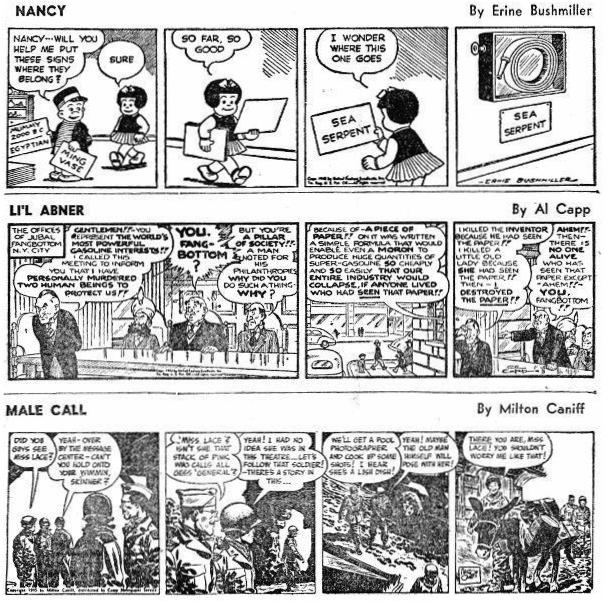
Drum Factory For Transport of Gasoline Three Steel Barrels Per Minute Roll Off Production Line of the Most Modern Factory Overseas, Alleviating Former Shortage 1346 BU, India - Steel gasoline drums, this theater's new "weapons," are rolling off the production line here at the rate of three every minute. Called the "Fighting Fifty-five," the new lightweight gas drums are turned out by the joint efforts of the ATC and Services of Supply troops at a factory known as the QM Large Drum Manufacturing detachment. In a space less than half the size of a city block, which 90 days ago was jungleland, this inter-command effort has alleviated the existing shortage of gasoline barrels. Off In Few Minutes Now in an eight-hour day, 1,440 barrels come off the line, with the goal for May set at more than 50,000. Not far from the production line, the barrels are filled with gasoline. Within a few minutes after they are filled, many are aboard C-54s of ICD's fleet, on their way over the Hump where the much needed fuel goes to the 14th Air Force for the battle against the Japanese. ICD uses only pilots with long, trouble-free records of transport flying to deliver the important fuel cargo. Construction of the barrel plant was started last December by the engineers, in co-operation with the quartermaster, when the need for "drums by the thousands" appeared imminent. Modern production Line machinery for the intricate setup was flown and shipped from the U.S. on a high priority and assembled, some of it in Calcutta, but most of it on the site of the plant. Army engineers and technical representatives were rushed here from the Middle East. Among them was Capt. Robert McCreery who represented the QM department on similar projects in Egypt and other places. According to tech reps and the CO of the unit, Capt. Frank B. Vance, the machinery rolling the drums off the production line is probably the most modern ever used by the U.S. Army in such an effort, certainly the most modern in a foreign theater of operations. Success of the venture is without parallel in the Army's manufacturing experiences. Six diesel generators were required to furnish the power for the project, three large Chicago Pneumatics and three small Cummins plants. They were taken to the site by barge and 20-ton trailers. Made of Sheet Steel Metal for the light drums, 16-gauge steel in bundles of 90 sheets, is shipped directly from the U.S. One bundle of metal requires only about 100th of the shipping space which would be required for 90 drums, saving inestimatable cargo space. Supply now on hand would run the plant for nine months and more is rolling in each day. Processing of the metal plates from storage rooms to the end of the production line
Then they slide into the flash welder, which binds the ends of the steel. A flanger makes cuffs on the ends of the barrel, a process which prepares the drum for the hoop expander. The expander neatly attaches two rolling hoops. The next stop is the double reamer, which seals both ends. Finally, two chime bands are placed on each end of the barrel as reinforcements. Prefabricated ends and chime bands are being used temporarily. At the end of the line the barrels are given their test. Twelve pounds air pressure is then pumped into them, while the drums are submerged in soapy water. If there is a flaw, bubbles will arise. After the test is made, the barrels are sprayed with oil and painted. Superintendent of the factory is Lt. R. W. Marten, assisted by Lt. J. F. Jack. Both men praise the enlisted men engaged in the job, including M/Sgt. Lloyd Smith, the plant's master mechanic.
Golden Grail of Magicians 1305 BU, Calcutta - For many years people have been hearing about the famous Hindu rope trick. This "trick" has baffled magicians and laymen for centuries, but two soldiers at 1305 have discovered the hidden secret. They can perform the trick. Sgt. Lazar E. Levinthal and Cpl. Harold I. Silver, both of New York state, finally, after many tedious months of practice with Hindu fakirs, have mastered the famous illusion. According to Levinthal, the trick works something like this: "First you must have a good Indian rope. The American style doesn't seem to work as well. After you have the rope, then you must have your usual flute. Again, the American type doesn't work, but the Indian reed-flute seems to be all right. You see, when blowing the flute, you must produce a very definite number of vibrations in each tone, and each tone must follow a particular pattern. Now after you have obtained the right kind of Indian rope and are sure you know exactly what to play on your flute - and how to play it - you are ready to proceed with the feature. Now if you sit directly in front of the rope, or slightly to the left, and have your rope loosely coiled, without any knots or tangles, the chances of making the rope dance are much better. Like the cobra, the rope does not actually dance. Rather, the weird vibrations from the flute seem to agitate the sensitive fibers within the rope and make the entire affair move slowly back and forth, rising higher and higher, into the air all the time. Oh yes, there is one more point," he added reflectively, "a good stiff wire running through the center of the rope seems to help a lot." 'Let's Have Light,' Says Chaplain, and Lights There Are! 1330 BU, Assam - "Let there be light," and there was light. A recent bulb shortage had afflicted living quarters, day rooms, latrines and showers. It was almost getting rough enough to make a man think he was in upper Assam. Then a Man of God stepped into the picture - Chaplain Capt. William P. McMullen. In just a few hours the place was aglow again. Some wonder what powers were brought to bear, and some just wonder where he got the bulbs. But to credulous and skeptical alike, the chaplain has one answer: He refuses to sing. Dishes' Turnaround Time Slashed with Dishwashing Outfit 1342 BU, China - "Turnaround" time for this base's mess hall dishes and tableware has been cut considerably by the construction of a dishwashing machine. There are no figures in statistical control but according to Lt. Roland K. Lee, mess officer, the device is a great time-saver. Besides solving the problem of tableware shortage, the machine also insures thorough sterilization. Constructed by the engineering department, the washer has the blessing of the flight surgeon and the CO - and the KPs.
New Twist to Old Story - The Reunion Never Takes Place 1340 BU, China - Here's a story that didn't turn out to be a reunion. From the beginning, the thing had all the earmarks of the good old reunion yarn. Sgt. Lewis A. Johnson casually mentioned that he heard his brother, whom he hadn't seen for 15 years, was stationed less than 20 miles away. Everyone began co-ordinating to get the brothers together. After much shouting into the phone and checking of records, it was finally established that Sgt. Johnson's brother, Harry, had left for Uncle Sugar. I & E Men Comb Bashas, Tents, Get 2,000 Books In Hunt 1328 BU, Assam - Combing every basha and tent on the base, the I & E department has come up with a library containing almost 2,000 books. Sgt. Joseph Nappi and Pvt. Joseph Masini did the collecting and salvaged 1,500 pocket books and several hundred clothbound jobs. Now the GIs can go to the central library and borrow a book saving the trouble of kicking over improvised book stands in their Quest for reading material. Personnel of the base were notified that the men would be around for books and were asked to leave contributions in a conspicuous place for the "baksheesh wallahs." Nobody as yet reported any missing cans of beer. HUMP EXPRESS is the official newspaper of the India-China Division, Air Transport Command, APO 192, c/o Postmaster, New York, N.Y., and is published by its Public Relations office. Camp Newspaper Service and Army Newspaper Service features are used, reproduction of which is prohibited without permission of CNS and ANS, 205 East 42nd St., New York, 17, N.Y. Other material is submitted by staff members, ICD-ATC base Public Relations sections and other soldier correspondents. Printed weekly by the Hindusthan Standard, 3 Burman St., Calcutta, India, and distributed each Thursday. Passed by U.S. Press Censor for mailing.

APRIL 12, 1945 Original issue of HUMP EXPRESS shared by CBI veteran Grover P. Fike Copyright © 2008 Carl Warren Weidenburner OVER THE HUMP TOP OF PAGE PRINT THIS PAGE ABOUT THIS PAGE E-MAIL YOUR COMMENTS PREVIOUS ISSUE HUMP EXPRESS BASE NEXT ISSUE |
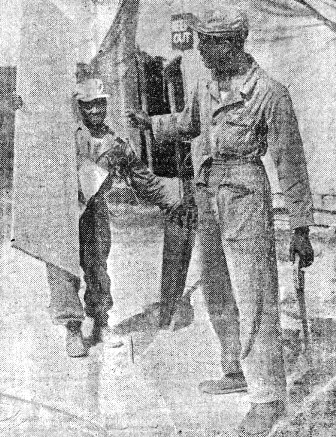 1333 BU, Assam - When there is work to be done, one can count on the little fellow to carry the burden. In this
case it's Pfc. Amos "Shorty" Cooper, Chester, Pa., who carries planks, side boards, two saws and a drill. Shorty's
assistant (by the books) Pvt. George McKinney, Jacksonville, Fla., gives moral support and even carries a tool if it's
small. Both men work at the carpenter shop here.
1333 BU, Assam - When there is work to be done, one can count on the little fellow to carry the burden. In this
case it's Pfc. Amos "Shorty" Cooper, Chester, Pa., who carries planks, side boards, two saws and a drill. Shorty's
assistant (by the books) Pvt. George McKinney, Jacksonville, Fla., gives moral support and even carries a tool if it's
small. Both men work at the carpenter shop here.
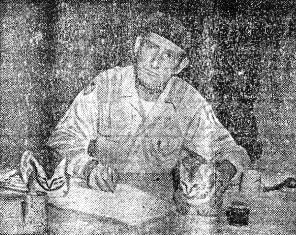 "Pop" Brennan on duty at the "H" area orderly room here in his 52nd year and second war. Had the picture been made
a few weeks earlier, it would have shown (left to right) Sad Sack, Pop and Lulu Belle. But Lulu Belle took to acting
up some, about the time spring came on, and has been redesignated Larry Belle.
"Pop" Brennan on duty at the "H" area orderly room here in his 52nd year and second war. Had the picture been made
a few weeks earlier, it would have shown (left to right) Sad Sack, Pop and Lulu Belle. But Lulu Belle took to acting
up some, about the time spring came on, and has been redesignated Larry Belle.
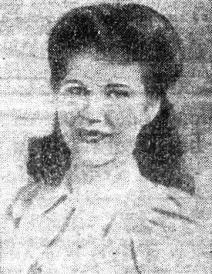 1328 BU, Assam - In a beauty contest sponsored by the information and education section, Miss Ann Elizabeth
Taylor was selected over a host of entries, as the "Sweetheart of 1328."
1328 BU, Assam - In a beauty contest sponsored by the information and education section, Miss Ann Elizabeth
Taylor was selected over a host of entries, as the "Sweetheart of 1328."
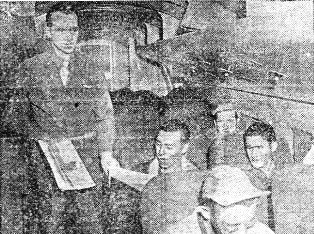 An inside view of the first passenger liner to be put into use for intra-China flights. Here, the flight clerk,
Pvt. R. Sweeney presents riders with copies of the China Lantern, China Theater weekly, before they depart.
Reading lamps at each seat allow reading at all hours.
An inside view of the first passenger liner to be put into use for intra-China flights. Here, the flight clerk,
Pvt. R. Sweeney presents riders with copies of the China Lantern, China Theater weekly, before they depart.
Reading lamps at each seat allow reading at all hours.
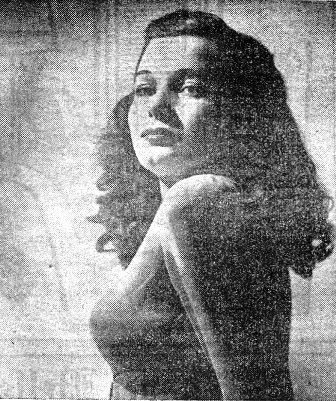
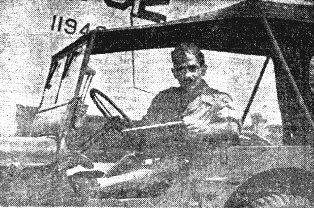 Capt. James P. Scott, ICD artist whose drawings appear weekly, is shown as he sketches operations on the line
at an airbase near Calcutta.
Capt. James P. Scott, ICD artist whose drawings appear weekly, is shown as he sketches operations on the line
at an airbase near Calcutta.
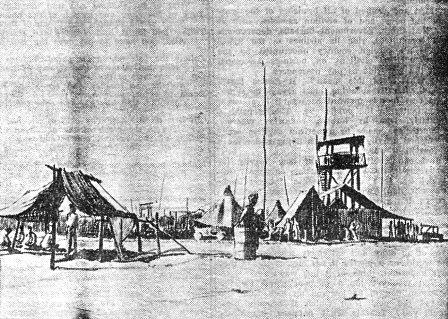 Capt. James P. Scott made this brush drawing at an ICD Burma forward base immediately after the expulsion of
the enemy. Mingled with the tents on the line are other temporary structures making use of available materials.
All have been replaced by more elaborate structures.
Capt. James P. Scott made this brush drawing at an ICD Burma forward base immediately after the expulsion of
the enemy. Mingled with the tents on the line are other temporary structures making use of available materials.
All have been replaced by more elaborate structures.
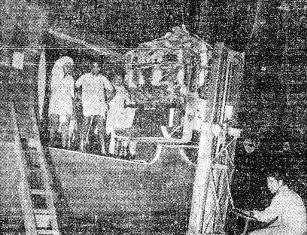 1. In the early hours of the morning, high priority freight goes aboard the Trojan, destined for China.
Here a fork lift piloted by a GI is hoisting aboard an aircraft engine wrapped in cellophane. (Continue below)
1. In the early hours of the morning, high priority freight goes aboard the Trojan, destined for China.
Here a fork lift piloted by a GI is hoisting aboard an aircraft engine wrapped in cellophane. (Continue below)
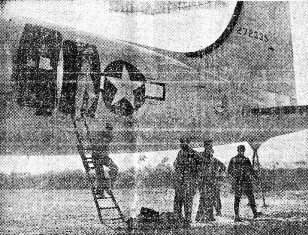 4. Off come the few high-priority passengers, who have made the direct run, saving hours of time and possible
delays. Chinese, Americans, British - all nationalities essential to the war effort are carried.
4. Off come the few high-priority passengers, who have made the direct run, saving hours of time and possible
delays. Chinese, Americans, British - all nationalities essential to the war effort are carried.
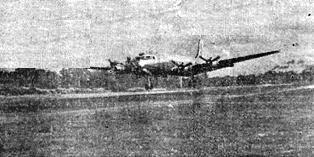 2. As the morning sun brightens the sky, the Trojan is off on its non-stop flight over the Hump to Kunming.
En route, the plane may be forced to extreme altitudes to avoid bad weather and delay.
2. As the morning sun brightens the sky, the Trojan is off on its non-stop flight over the Hump to Kunming.
En route, the plane may be forced to extreme altitudes to avoid bad weather and delay.
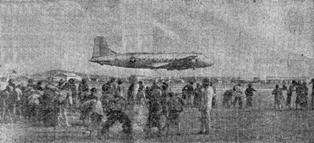 5. "Off with a hell of a roar," the giant 54 points back to India after being serviced at Kunming and taking aboard
medical evacuees and other passengers. Runway under construction in foreground.
5. "Off with a hell of a roar," the giant 54 points back to India after being serviced at Kunming and taking aboard
medical evacuees and other passengers. Runway under construction in foreground.
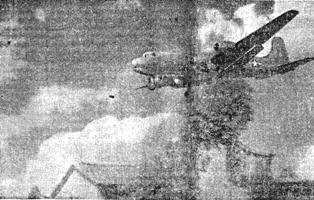 3. Let-down at Kunming takes the Trojan over a Chinese village at the end of the runway. So common are planes
above the ancient town that the Chinese scarcely look up any more when the aircraft thunder over.
3. Let-down at Kunming takes the Trojan over a Chinese village at the end of the runway. So common are planes
above the ancient town that the Chinese scarcely look up any more when the aircraft thunder over.
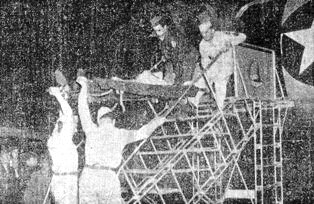 6. Back at the base from which the ship took off in the morning, patients are tenderly carried from the cabin by
medical corpsmen and ICD GIs who assist them. Stairway was built from salvage.
6. Back at the base from which the ship took off in the morning, patients are tenderly carried from the cabin by
medical corpsmen and ICD GIs who assist them. Stairway was built from salvage.
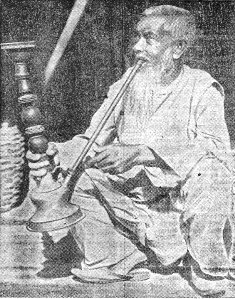 If pipes grew beards, this old-fashioned one probably would have a fuzzy growth as long as its owner has. Modern
day versions of pipes, however, are not much different, and it's a common sight in India to see this "spool bed post"
version being puffed by ancient Indians squatting by the roadside.
If pipes grew beards, this old-fashioned one probably would have a fuzzy growth as long as its owner has. Modern
day versions of pipes, however, are not much different, and it's a common sight in India to see this "spool bed post"
version being puffed by ancient Indians squatting by the roadside.
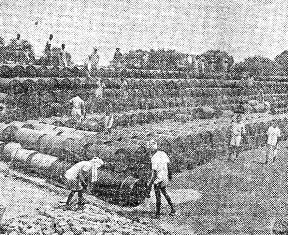 Stacked up outside the QM drum manufacturing plant at 1346 BU are thousands of 55-gallon gasoline drums ready
to be filled and flown over the Hump by C-54s. The drums, being stacked by Indians, are turned out at the rate of
three a minute.
Stacked up outside the QM drum manufacturing plant at 1346 BU are thousands of 55-gallon gasoline drums ready
to be filled and flown over the Hump by C-54s. The drums, being stacked by Indians, are turned out at the rate of
three a minute.
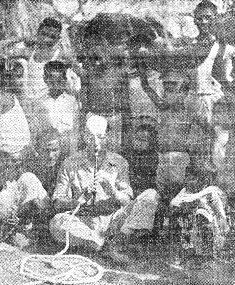 Sgt. Lazar E. Levinthal, of 1305 BU, performs the Indian rope trick known to few wallahs - oriental or occidental.
Those who may have seen Hindus perform the "magic" stand enthralled by this performance by the talented GI.
Sgt. Lazar E. Levinthal, of 1305 BU, performs the Indian rope trick known to few wallahs - oriental or occidental.
Those who may have seen Hindus perform the "magic" stand enthralled by this performance by the talented GI.
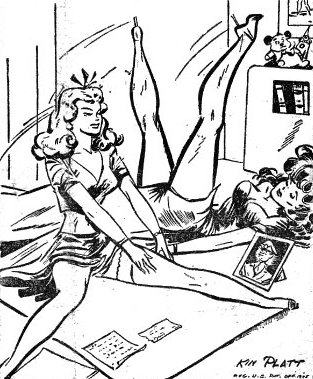 "After two years in Assam, coming back for 30 days would be perfect - but 45 - wow!"
"After two years in Assam, coming back for 30 days would be perfect - but 45 - wow!"